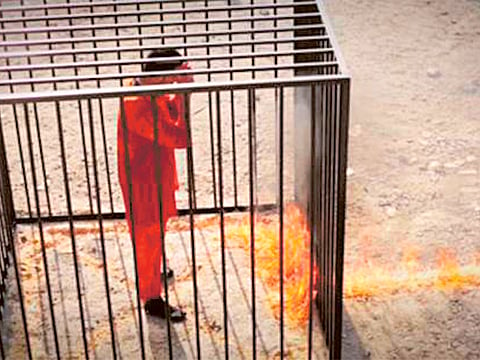Can Daesh be contained or defeated?
Western nations at odds on how to fight militant threat

Dubai: The 25-minute video is chilling. From the clean-shaven Daesh fighters standing guard, a first wisp of flame then set to the ground, quickly jumping to set the petrol-soaked soul of caged and captive Lt Muath Al Kaseasbeh alight, to the choreographed dumping of rubble on his burnt remains — every aspect of the Daesh video is professional.
And meant to instil fear.
In Amman, King Abdullah has vowed a relentless war against Daesh: “We are waging this war to protect our faith, our values and human principles and our war for their sake will be relentless and will hit them in their own ground,” the king said.
But just what can be done to defeat Daesh across the territory it holds straddling Iraq and Syria? That’s a question being asked by the 60-nation coalition who are involved in the fight against the group, formerly known as Islamic State in Iraq and the Levant.
In London a committee of British parliamentarians believe containing Daesh may be a more realistic strategy than defeating it. At the same time, they called on Britain to play a greater role in the fight against the militants in Iraq and Syria.
Britain has so far taken part in US-led air strikes against the Islamist group in Iraq, but not Syria. It has also provided some equipment and training for Kurdish forces.
Parliament’s defence committee said in a report released on Thursday that these actions were “strikingly modest”, with on average less than one air strike a day, and said it was “surprised and deeply concerned” Britain was not doing more.
The Iraqi security forces are weak and lack resources, the committee said, while the country’s communities are divided and regional powers remain deeply suspicious of each other.
“There is a significant gap between the rhetoric of Britain and its partners, and the reality of the campaign on the ground ... It will be very difficult to destroy Daesh,” the report said.
“Given the deep polarisation and structural weaknesses of the Iraqi state, we wonder whether containment and suppression of Daesh would not be a more realistic goal than total elimination.”
The committee said that it was not calling for combat troops to be deployed, a move the coalition government of Prime Minister David Cameron has ruled out, but said Britain should meet a request from the Iraqi army to provide training to counter roadside bombs and also help with mission planning and tactics.
It also criticised ministers and military chiefs for failing to provide a clear idea of Britain’s objectives or strategy in Iraq and called on the government to “radically” increase its defence and diplomatic engagement with regional powers such as Turkey and Saudi Arabia.
Failures in Iraq
“We must clearly acknowledge the previous failures in Iraq, and reform our approach. But that does not mean lurching to doing nothing,” said committee chairman Rory Stewart, a lawmaker from Prime Minister David Cameron’s Conservative Party.
“There are dozens of things the UK could be doing ... to work with coalition partners to help address one of the most extreme threats that we have faced in the last 20 years.”
In Washington, President Barack Obama’s nominee for Secretary for Defence, Ashton Carter, was grilled by Republicans who used his confirmation hearing to criticise White House foreign policy on every front — from battling Daesh to supporting Ukraine to trying to shutter the US prison at Guantanamo Bay.
Carter is on the fast track to being the president’s fourth defence secretary in six years, but despite back surgery he endured several hours of questioning by members of the Senate Armed Services Committee, now in Republican control.
Committee Chairman John McCain pounced on Obama’s strategy to combat Daesh, asking Carter what the administration’s strategy was to confront its threat.
Carter said the goal was to defeat Daesh forces in a way that “once they are beaten they stay beaten.” In Iraq, that will be the job of the Iraqi security forces, which Carter said he understood would begin to take back territory in coming months. In Syria, the US is helping build a fighting force of moderate Syrian regional forces to take on the militants.
“It doesn’t sound like a strategy to me,” McCain said. “It sounds like a series of goals.”
Meanwhile, Germany is to restrict extremists from travelling abroad to join militant operations and will clampdown on sources of terror funding.
Justice Minister Heiko Maas said Germany would soon have “one of the strictest anti-terror laws in all of Europe.”
The legislation seeks to prevent the export of extremists to the Middle East and will also make fund-raising for terrorist organisations illegal and enable the authorities to punish those involved in collecting donations for such groups or contributing to them.
Around 600 militants from Germany have already joined Daesh militants so far.
— With inputs from agencies
Sign up for the Daily Briefing
Get the latest news and updates straight to your inbox


